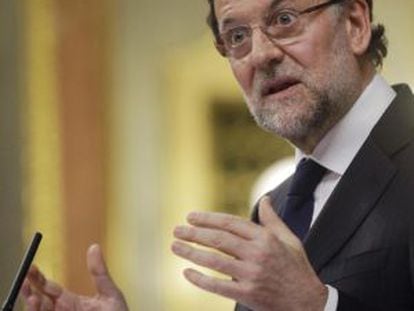Spain’s influence in Brussels shrinks under Rajoy
Diplomats agree that the region’s fifth largest economy is losing political relevance in the EU


The date is February 19, 2015. Acting Spanish prime minister Mariano Rajoy arrives at a key European Council meeting to discuss the UK referendum on remaining in the EU. There are around 200,000 Spaniards living in Britain and their future could be compromised if Brussels allows London to discriminate against European workers.
The first session stretches on. All the leaders take turns speaking to draw their own red lines in lengthy addresses. All, except one. Diplomats who were present at the gathering say that Rajoy employed fewer than 50 words to express support for the conclusions, and to say that any limitation to freedom of movement “should be temporary.”
In percentage terms, Rajoy’s statement represents one percent of all words uttered at the meeting. Nobody in the room spoke less than the leader of the region’s fifth largest economy.
The Germany of the South became once again your stereotypical Club Med
Josef Janning, ECFR
And that was no exception. With few exceptions, Rajoy’s voice has barely been heard at the Council, say diplomats from six delegations.
For this and other reasons, Spain is losing clout in Brussels. It was already fading into the background under former prime minister José Luis Rodríguez Zapatero, who was never comfortable in Brussels and was ultimately forced into a corner in May 2010 and made to take the axe to Spain’s public spending.
Rajoy has been apathetic during every visit to the European capital, in contrast with the proactive attitudes of his foreign and economy ministers, José Manuel García-Margallo and Luis de Guindos. The rest of his cabinet are nowhere to be seen. Spain may head the global unemployment charts, but the acting labor minister, Fátima Báñez, has missed half the EU meetings on the subject.
Sign up for our newsletter
EL PAÍS English Edition has launched a weekly newsletter. Sign up today to receive a selection of our best stories in your inbox every Saturday morning. For full details about how to subscribe, click here.
Spain punched above its weight during the administration of Felipe González in the 1980s and 1990s, and kept up a high profile under his successor, José María Aznar.
But the nation’s influence in the EU has been visibly waning ever since then. The reason has partly to do with the crisis and a bank bailout that cost €40 billion and eroded Spain’s credibility on the international markets. It is also partly because Madrid has lost all its battles for positions of influence: it lost its seat on the European Central Bank and failed to secure the presidency of the Eurogroup for De Guindos.
Above all, however, it’s a problem of attitude, say observers. Madrid barely proposes any initiatives, it is incapable of forging alliances —except with Germany, none of which has produced a return on investment— and it has shown a reactive attitude on all major issues, including the refugee crisis.
A recent study by the Pew Research Center shows that half of Spaniards believe Spain is playing a smaller role in the EU than it did 10 years ago. And elites share the feeling: a survey by the European Council on Foreign Relations (ECFR) among high-ranking EU officials and think tanks suggests that Spain has lost significant ground compared since the 1990s, when “it threatened to overtake Italy’s influence.”
“The bailout changed Europeans’ perception [of Spain]: the Germany of the South became once again your stereotypical Club Med”, sums up Josef Janning of the ECFR.
English version by Susana Urra.












































